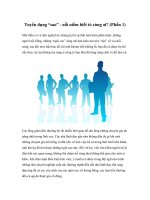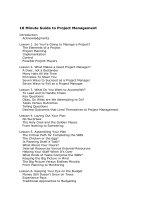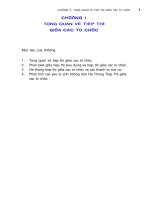10 ESSENTIAL KEYS TO PERSONAL EFFECTIVENESS phần 1 pps
Bạn đang xem bản rút gọn của tài liệu. Xem và tải ngay bản đầy đủ của tài liệu tại đây (364.68 KB, 9 trang )
1
1
0
0
E
E
S
S
S
S
E
E
N
N
T
T
I
I
A
A
L
L
K
K
E
E
Y
Y
S
S
T
T
O
O
P
P
E
E
R
R
S
S
O
O
N
N
A
A
L
L
E
E
F
F
F
F
E
E
C
C
T
T
I
I
V
V
E
E
N
N
E
E
S
S
S
S
$5.95 US
Written by Michael Angier
Copyright 1997 Success Networks
1
10 Essential Keys
to Personal Effectiveness
Published by
Success Networks International, Inc.
Win-Win Way, PO Box 2048
South Burlington, Vermont 05407-2048
Copyright 1997 Success Networks, International, Inc.
Manufactured in the United States of America
No part of this publication may be reproduced, stored in a retrieval system or
transmitted in any form by any means, electronic or mechanical, photocopying,
recording, scanning or otherwise except as permitted under Section 107 or 108 of
the 1976 United States Copyright Act, without the prior written permission of the
Publisher.
Limit of Liability/Disclaimer of Warranty
While the authors have used their best efforts in preparing this report, they make
no representation or warranties with respect to the accuracy or completeness of the
contents and specifically disclaim any implied warranties. The advice and
strategies contained herein may not be suitable for your situation. You should
consult with a professional where appropriate. The authors shall not be liable for
any loss of profit or any other commercial damages, including but not limited to
special, incidental, consequential or other damages.
2
10 Essential Keys
to Personal Effectiveness
Table of Contents
Keys to Personal Effectiveness 4
The Art and Joy of Being Efficacious 4
Efficacy 4
Doing the Right Things 4
Clarity Leads to Power 5
Live in the Question 5
Values 5
Keep Your Word 6
First Things First 6
ABC List 6
The 80/20 Rule 6
Covey’s Quadrant 7
Do You Have To? 7
Learn to Say “No” 7
Ask Lakein’s Question 7
Schedule Our To-Dos 7
Tools & Technology 8
Computers 8
Software 8
Contact Manager, Scheduler, Task Manager 8
Personal Planner 8
Strive to Have a Paperless Existence 8
Tape Recorders, CD and MP3 Players 8
Systematize 9
Be Organized 9
Have a Place for Things 9
Delegate 9
Write it Down 9
KISS 9
Let Go of the Past—Without Guilt 10
Become a Master 10
Health & Energy 10
Make it Fun 10
Keep a Sense of Humor 11
Inspiration 11
Find Things that Motivate You 11
Reward Yourself 11
Overcome Procrastination 11
Consistency 11
3
10 Essential Keys
to Personal Effectiveness
Support 12
Create Your Own Success Team 12
Build Reserves 12
And Finally . . . 13
Knowledge Isn’t Free 14
SuccessNet Resources 16
About Success Net 17
4
10 Essential Keys
to Personal Effectiveness
Keys to Personal Effectiveness
The Art and Joy of Being Efficacious
HAVE YOU EVER WONDERED why some people seem to accomplish so
much while others struggle along barely able to attend to their daily
needs? Highly effective people usually fulfill their achievements with
less work and effort than those who accomplish little. The difference
is in their focus, intention and skills—all of which can be mastered.
In the pages to follow, we’ll touch on several techniques and
strategies that can enable you to optimize your potential. This report
is for people who want to be more effective—people who want to get
more done in less time while enjoying the process. It’s for people
wanting to experience greater fulfillment and create more value in
their lives and the lives of those around them.
We all enjoy the satisfaction that comes from getting things done and
doing them well. I’ve even gone so far as to write things on my to-do
list after they were done just to experience the little joy of checking
them off. When we feel productive, when we think we’ve
accomplished something worthwhile, our confidence and self-esteem
increases. Even our endorphins are triggered. We feel exhilarated.
Our life is more fun.
Efficacy
The goal is efficacy—one of my favorite words. Efficiency is doing
something with the least amount of effort, time and resources
available. Effectiveness means getting positive results—doing things
which are worthwhile.
You can be efficient without being effective—doing things that don’t
matter—like rearranging the deck chairs on the Titanic. You can be
effective without being efficient—doing something worthwhile, but
taking too much time or having it cost too much. What we want to
strive for is efficacy.
Doing the Right Things
The intention of this report is to help you do more of the right things
faster, easier and with less frustration. It’s intended to help you get a
better handle on your life—to make more useful choices and to effect
those choices in ways that make your life a more rewarding
experience.
Many of the suggestions may appear simplistic. But don’t let their
simplicity cause you to overlook the insight and miss the nuggets of
wisdom they contain. Many of the concepts are simple, but they’re
not simplistic. They’re proven principles and systems that have
worked for many others. Some are ancient and have been used by
5
10 Essential Keys
to Personal Effectiveness
the masters for centuries. Others are relatively new. We invite you to
try them and see for yourself how helpful they can be.
Clarity Leads to Power
It’s absolutely critical that we become and remain clear on our
intended outcomes. Mark Twain said, “I can tell anyone how to get
what they want if I could only find someone who knew what it was.”
When you’re absolutely clear on what it is that you want, and are
determined to get it, there’s no stopping you. Lack of clarity and
focus is one of the most common failings.
The subconscious mind doesn’t deal well with generalities. It likes
specific messages. As someone once wrote, “You can’t play an
uncertain instrument.” By giving your mind clear instructions and
no vagaries, you’ll develop a powerful congruence, which will almost
magically seek out and attract your objectives.
Have specific outcomes for everything— telephone calls, meetings,
tasks, etc.—for each day and each month.
Live in the Question
Tony Robbins says, “Quality questions create a quality life.
Successful people ask better questions, and as a result, they get
better answers.” One of the biggest payoffs in retaining a consultant
or counselor isn’t so much the advice they give, but rather the
questions they ask. They make us think.
Learn to ask yourself questions that increase your clarity and
generate solutions. Ask IWWCW questions. IWWCW stands for In
What Ways Can We . . . always be asking why, when, how, why not,
what if, etc.
Values
Each of us has our own value system. We’re not talking morality
here. We’re speaking of the beliefs we have that are well established,
even if they’re not consciously apparent. When you operate outside
this value system, you can’t be effective. And it’s paramount that you
discover these values and honor them.
INTEGRITY
It is not what we eat
but what we digest
that makes us strong;
not what we gain
but what we save
that makes us rich;
not what we read
but what we remember
that makes us learned;
and not what we profess
but what we practice
that gives us Integrity.
—Anonymous
Abraham Maslow referred to this unity between our values and our
everyday performance as self-actualization. “It is a bringing together
of what I do and what I really value.”
In The Ten Natural Laws of Successful Time and Life Management,
Hyrum Smith writes, “The secret to achieving inner peace lies in
understanding our inner core values—those things in our lives that
are most important to us—and then seeing that they’re reflected in
the daily events of our lives.”
6
10 Essential Keys
to Personal Effectiveness
Keep Your Word
When you break your word—to others or yourself—you’re out of
integrity, and your self-esteem and confidence suffers. You need
confidence to optimize your productivity, and it’s drained by not
keeping your promises.
Bucky Fuller said it best: “Integrity is the essence of everything
successful.” Success in any endeavor demands an unshakable
character.
We recommend this eCourse:
/>
First Things First
There’s no way to do everything we’d like to do. We can do anything
we want, we just can’t do everything we want. We have to prioritize.
We need to be working on the things that are the most important. By
doing so, we’ll see the greatest payoff. Plan your work, and work your
plan.
ABC List
When you make a list of things to do, assign a value to each one. “A”
means something you’re absolutely committed to doing—something
that must be done. “B” is for tasks you want very much to get done
and eventually will be done—they’re just not urgent. “C” items are
for those things you’d like to do, have an intention to do, or what I
call, “It’d be nice.” By assigning these priorities, you’ll find it easier
to determine on which items you should be working. If you’re
working on C items, it’s probably because you’re avoiding the As and
Bs.
The 80/20 Rule
80 percent of your results will usually come from 20 percent of your
efforts. Find out what that is and focus on that 20 percent.
7
10 Essential Keys
to Personal Effectiveness
Covey’s Quadrant
Stephen Covey developed a matrix to enhance our perspective on our
tasks and gain a greater awareness of their priorities.
The greatest payoff comes from working on projects that are in
quadrant II (important, but not urgent). By focusing on quadrant II
activities, we’ll position ourselves to spend less time handling crises.
Do You Have To?
Some things you may not really have to do. Ask yourself this
question, “Would something terrible happen if I didn’t do this?” We
often spend time doing things that we only thought were necessary.
Learn to Say “No”
It’s not easy at first, but you’ll get better at it. If you don’t set your
priorities, someone else will do it for you—with their requests.
Ask Lakein’s Question
What’s the best use of my time right now? With very little effort, you
can usually determine the answer, but you have to ask the question.
And ask it often.
Schedule Our To-Dos
It’s not enough to list the things you plan to do. You need to schedule
them just like they were an appointment. Otherwise, they often
won’t get done. Keep in mind, however, that as you plan, the key is
not to prioritize your schedule, but to schedule your priorities.
8
10 Essential Keys
to Personal Effectiveness
Tools & Technology
Call it your Success Toolbox. We must keep up to date on the tools
technology has to offer.
Computers
Operating successfully in the new century without being competent
with computers and being online isn’t too likely. If you don’t have a
computer, get one. If you don’t know how to use it, take a class.
If you’re not online, sign up with one of the commercial online
services or a local Internet service provider and get your feet wet. It’s
fun, inexpensive, efficient, entertaining and educational.
Software
Today’s programs are powerful tools for getting your work done.
Spend the time necessary to learn the most up-to-date office suites
like MS Office or WordPerfect.
Contact Manager, Scheduler, Task Manager
Part of your computer system should be a personal information
manager (PIM) that will make it easy to keep track of people and
schedule your tasks and appointments. Once you have one, you’ll
wonder how you ever got by without it. We recommend Microsoft
Outlook. Act! and Gold Mine are two other good ones.
Personal Planner
If you’re not near your computer most of the time, you need a
planner. The DayRunner™ and The Franklin Planner™ are good
choices. The key here is to have everything in one place. Most PIMs
for the computer allow you to print out your schedule, address book
and task list for you to put into your carry-around planner.
Strive to Have a Paperless Existence
It’s not easy, but you can come close. Get things into your computer
system, print out only the things you have to, and remember to back
it all up regularly.
Tape Recorders, CD and MP3 Players
Most of us enjoy audio technologies in our car—a cassette tape
player, CD player or MP3 player. While you’re driving, you can stay
up to date on your industry, improve your people skills or even learn
a second language. Most of us spend a fair amount of time in our
cars, and we can be educating ourselves while we travel. It’s also a
good idea to carry a hand-held tape recorder for noting thoughts and
ideas as they occur to us.









